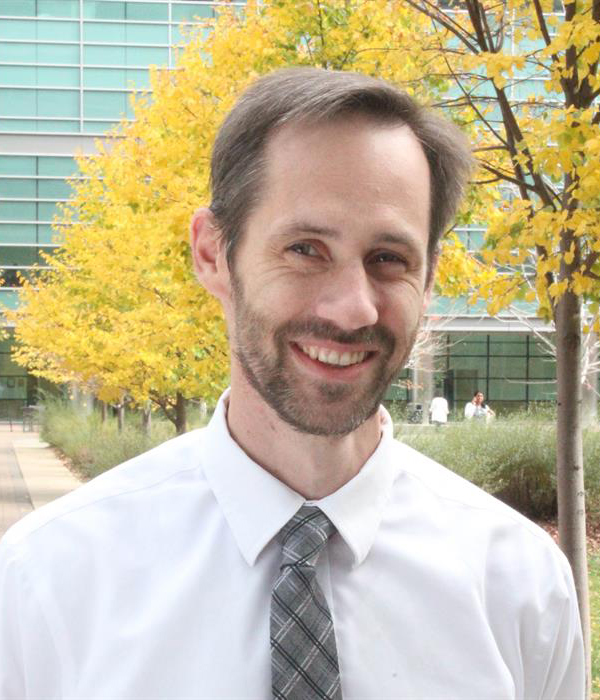
Dr. Pressman
Behavioral Neurologist
I am a cognitive and behavioral neurologist who joined the Rocky Mountain Alzheimer's Disease Research Center (RMADC) in 2016. I came to Colorado after training and working for four years at the University of San Francisco's Memory and Aging Center. Prior to that, I completed my residency training at Northwestern Memorial Hospital in Chicago, and I attended medical school at Oregon Health & Science University, where I had previously worked in the Alzheimer's Disease Center. I was drawn to Colorado for many reasons, including the exciting opportunity to help build a new dementia center in the Rocky Mountain region.
Research Goals:
I have two main research goals:
- I am developing new programs and tools to expand our ability to diagnose and care for people with neurocognitive disorders throughout all communities. Medical providers and patients alike often fail to recognize the heterogeneity of neurocognitive disorders. There's more out there than Alzheimer's disease, and many of these neurocognitive disorders are treatable, but only when they are looked for and recognized. Even in Alzheimer's disease, there's a lot that providers and patients can do to maintain quality of life. However, due to time constraints, unfamiliarity with established guidelines, and other obstacles, opportunities to improve quality of life in patients with neurocognitive disorders are often missed. As the population ages, there is an urgent unmet need not only for new treatments, but also for improving how people with neurocognitive disorders are diagnosed and cared for using already available tools.
- My research is focused on all aspects of communication in neurodegenerative disease, including not only what people say but also how they say it. Specifically, I am interested in objectively measuring language patterns using automated techniques, known as “computational linguistics,” as well as the melody of people's speech, known as “prosody.” I am also investigating other aspects of communication, such as facial expression, as an innovative approach to understanding how it may change over time in people with a neurodegenerative disease. I am interested in learning how changes in non-verbal or paralinguistic communication influence outcomes for patients and caregivers. I am also studying how changes in communication styles may provide clues about underlying neurodegenerative diseases.
Current Studies:
I am currently leading three projects related to my research goals.
- We have designed and are continuing to refine a computerized method of assessing patients who have concerns about their cognition. We are using this computerized assessment platform to educate patients, caregivers, and medical providers about potential steps in each patient's care. Our goal is to make this system publically available, thereby reducing the amount of time required to perform a high quality assessment of patients with neurocognitive disorders, and empowering patients and caregivers with the knowledge required to advocate for their own care.
- I am developing and testing computational speech analytic tools to measure what people say and how they say it, with the goal of improving early recognition of neurocognitive disorders, such as Alzheimer's disease. I am also investigating nonverbal aspects of communication, such as laughter. We can also compare these communication measures with established neuropsychological and language tests as well as with other disease-related metrics called biomarkers.
- The traditional model of how the brain controls facial expressions is likely over-simplified. We are now using high-speed videography and electrophysiological techniques to better understand how the brain makes simple expressions, such as a smile. This understanding will hopefully further assessments to help us pick up earlier on changes that point to neurocognitive disorders.
Impact:
There is a clear need to expand quality dementia diagnosis and care to underserved communities, where the benefits of early recognition are often overlooked. The use of technology to educate both medical professionals and the general public about neurocognitive disorders would have an immediate societal benefit, while also personally benefitting patients and families. Furthermore, the effective use of technology will help guide people towards appropriate research if they are interested, thereby also helping to improve dementia treatments in the future. Screening techniques could involve the broad distribution of standardized assessments and questionnaires, or the use of measurements of everyday activities, such as speech and language, which can show very early changes in the progression of neurodegenerative diseases, such as Alzheimer's diseases.
While the importance of language is undeniable and merits standardized study, paralinguistic communication, such as the melody of speech and facial expression, has received relatively little attention. Nevertheless, we learn to recognize the significance of a tone of voice or a specific facial expression long before we learn language, and when the two conflict, such as with sarcasm, we give precedence to the paralinguistic signal. Deficits in paralinguistic communication have been described in numerous neurological disorders, but the causes and consequences of such deficits remain poorly understood. An improved understanding of paralinguistic communication may lead to new avenues of both diagnosis and treatment of neurological illness.
I am honored to be a part of such a talented and caring team of clinicians and researchers. We look forward to building partnerships throughout the community in order to deliver exceptional care to people experiencing neurocognitive disorders along the entire spectrum.
